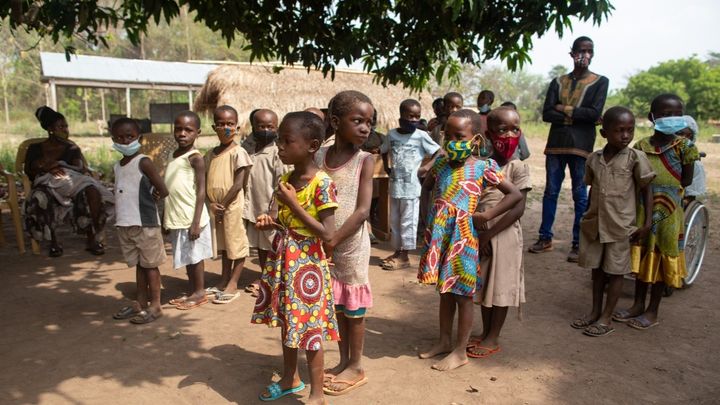
Support us to be a Support
Donation protected
Welcome to this solidarity “Support us to be a Support”!
The effect of COVID-19 on education across Africa is enormous . As students gradually return to on-site classes, assistance is needed to ensure they return to a safe and productive environment. This is most notably true in Kpalime, Togo, where underserved communities have fought hard to maintain schools with little support.
We have identified three schools from different villages; CEG-Nyive, Sevenokope Primary School and Zogbegan Primary School. These communities have long been neglected in terms of school infrastructure and equipment. Access to potable water and electricity in these communities are also everyday challenges. The state of the schools is now very poor, and both the teachers and the students are less able to complete their daily activities.
1. CEG-Nyive:
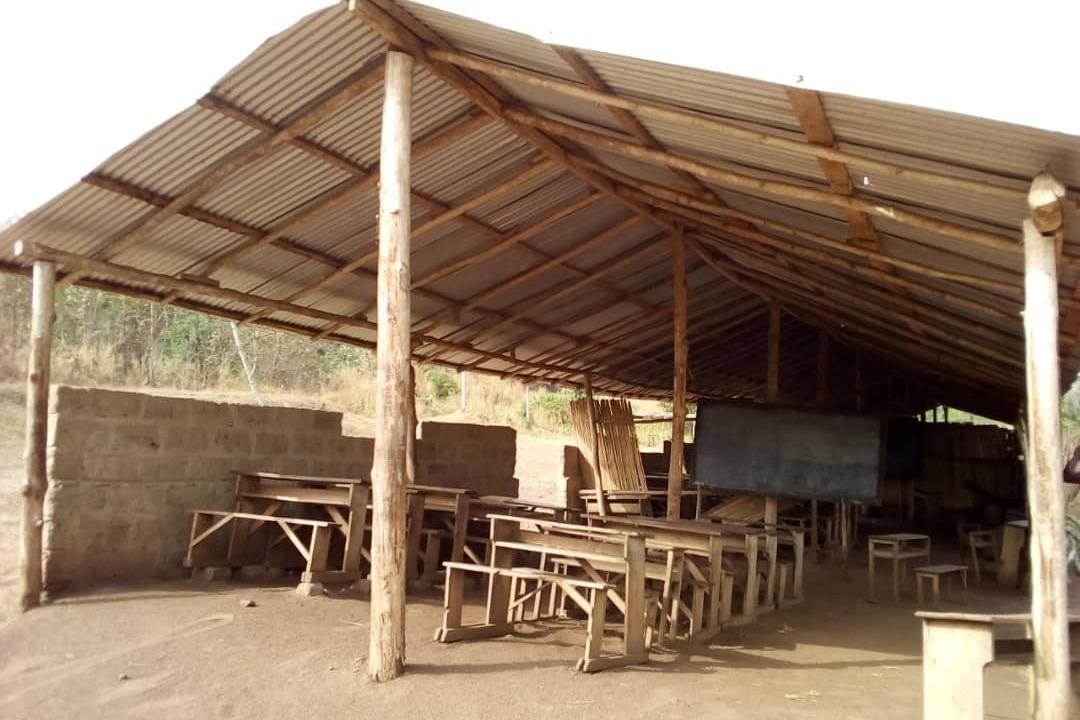
Nyive is the first village after you cross the border from Ho, Ghana, to Kpalime, Togo. Nyive is a small community of 150 people. It is a community that relies on small farming and trading activities. Despite efforts from the local community to rehabilitate the classrooms, they are still in a bad state. The classrooms are built with bamboo sticks around a bare floor and a small wall at one side of the building in a bushy surrounding. The classrooms contain fewer desks than students and very few tables are in good condition. The student body was at 127 at our last visit.
2. EPP-Sevenokope:
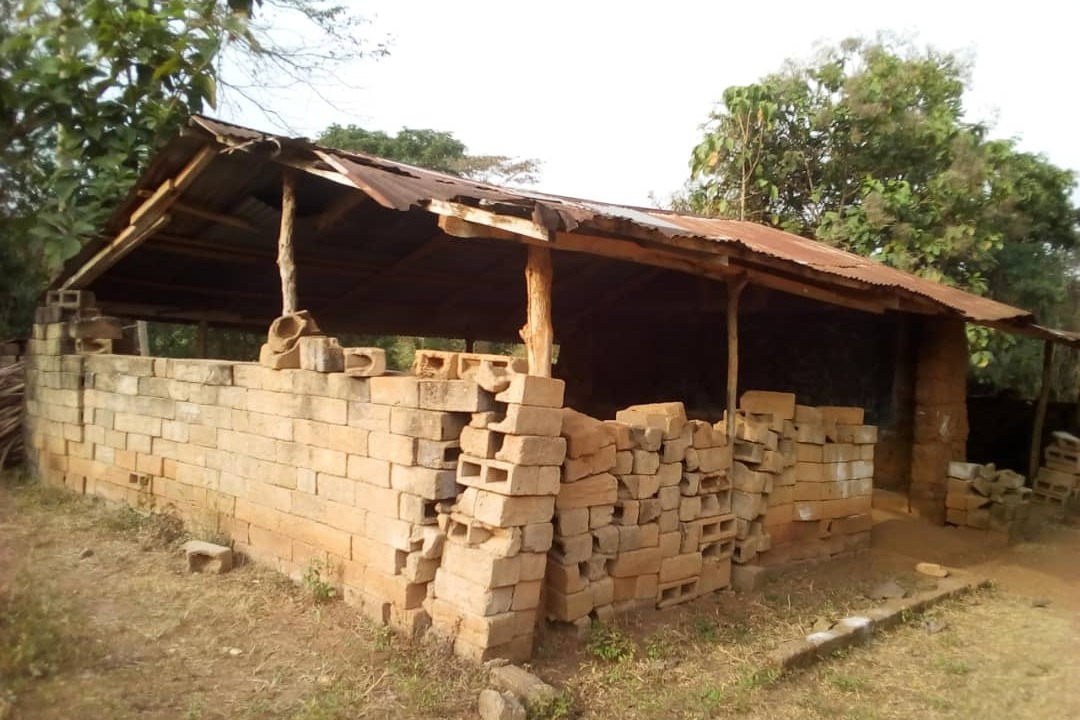
Sevenokope is a small community scattered along the main road leading to Kpalime. The primary school in this community is currently limited to just 2 classrooms. In both rooms, the broken roofing poses a threat. A small number of desks are placed on the rough ground and there is no proper lighting system inside. The number of students at the school was 69 when last visited.
3. EEP- Zogbegan:

Zogbegan is a very small community with a handful of houses. It hosts a primary school that is in particularly poor condition, the worst of all schools visited. Teachers educate students under a shed within the woods, surrounded by grass and under a small section of tin roof. There are no walls and no floor. The number of students at the school was 91 when last visited.
Students and teachers from these schools are exposed to a number of dangers on a daily basis. Most of the classrooms in these communities are made of temporary structures such as bamboo or palm tree sticks. These are not solid and regularly collapse during the rainy season. Therefore during this period , school is postponed to avoid this and other risks. These regular and prolonged interruptions can have a severe effect on student learning. The lack of continuity disrupts learning and the curriculum is rarely covered in full. Furthermore, the longer school is suspended, the less likely a child will return to continue their education. With no school to attend, students are often required to support the household with activities such as farming and chores. Many parents no longer believe in the education system to offer a better life for their children, school closures encourage this.
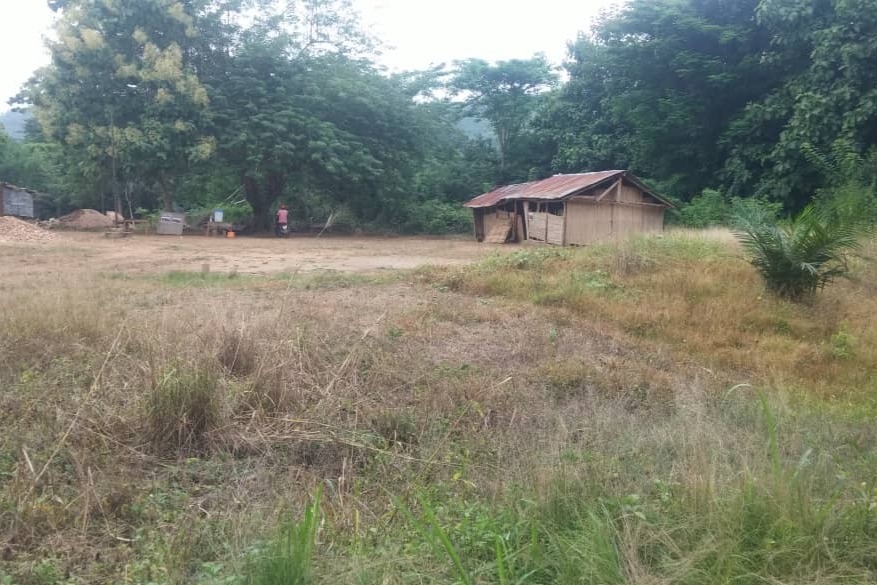
The open nature of these classrooms does not create a focused environment for learning. Students are distracted by the community that works around them, the animals that live nearby and are at the mercy of bushfires. Surrounded by bushes, it is not uncommon for students to be attacked by reptiles. At the time of our last visit, we were told there is a possibility of 2 attacks in 3 months during school session at one of the schools. Access to electricity, potable water in most this community is more of challenge as sanitation issues too.
Above all, the high poverty level within the communities has a major effect on the quality of education. It is common to see students attending school with just one exercise book and a single pen or a pencil and no bag. Lost incomes during the COVID-19 pandemic have negatively impacted families further.
We wish to be the catalyst to support a better future for these students and their communities. To do this, we have three action steps:
Step 1: Donation of school items to pupils (school bags, exercise books, pens, etc.)
Why start with this donation? Fresh equipment is a simple way to bring back the motivation and joy of studying. Each item will go a long way to facilitate the students return to the classroom, and effective and relevant tools will encourage a quality learning experience. Continued support on a small scale will support community collaboration and build trust for our subsequent projects.

Step 2: Constructions of classrooms blocks (classrooms, desks, etc.)
After our first step is taken, we expect a boost in the number of students staying in the school and new students joining. Parents will be much more hopeful and will regain trust in the education system. At this point, there are more reasons to put up well-structured and equipped classrooms to create an environment more conducive to learning. These classrooms will help solve the deplorable infrastructure of the schools and enable teachers and students to focus on an education without interruptions.

Step 3: Electricity, Water, and Sanitation projects (solar panels, water tank, etc.)
Electricity and sanitation are further areas of focus. Students and teachers can benefit from it in the sense that it will enable easy learning, teaching, and preparation during dark hours. Togo is close to the equator and therefore sun sets between 6 and 7 pm during all seasons. Proper lighting would enable students and teachers to also use the evenings for school preparations. We want to achieve this with the installment of photovoltaic panels.
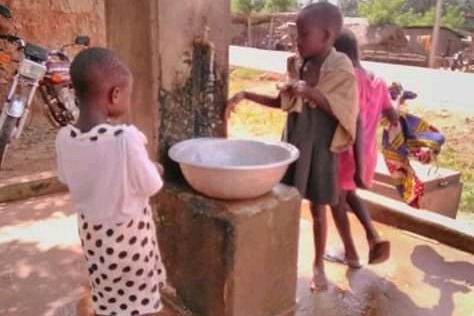
“Water is Life”, and as we always admit, is a problem in most of these communities. The installation of a big water reservoir at the school campus can serve the need for potable water in the school for the pupils and their teachers and the communities too. Since the kids have to walk quite far to get water before school, it affects their turn up to school on time and their focus in class.
We, AidToGo in collaboration with UWA , believe these communities deserve life-changing support. To do this, we have started this crowdfunding campaign. We aim to collect 2,000 Euros by 30th December 2020. With these funds, we will be able to undertake actions mentioned in Step 1 and prepare the infrastructure to move on with Step 2 and 3.
Thank you to everyone who is supporting us and the young generation of these villages.
The effect of COVID-19 on education across Africa is enormous . As students gradually return to on-site classes, assistance is needed to ensure they return to a safe and productive environment. This is most notably true in Kpalime, Togo, where underserved communities have fought hard to maintain schools with little support.
We have identified three schools from different villages; CEG-Nyive, Sevenokope Primary School and Zogbegan Primary School. These communities have long been neglected in terms of school infrastructure and equipment. Access to potable water and electricity in these communities are also everyday challenges. The state of the schools is now very poor, and both the teachers and the students are less able to complete their daily activities.
1. CEG-Nyive:

Nyive is the first village after you cross the border from Ho, Ghana, to Kpalime, Togo. Nyive is a small community of 150 people. It is a community that relies on small farming and trading activities. Despite efforts from the local community to rehabilitate the classrooms, they are still in a bad state. The classrooms are built with bamboo sticks around a bare floor and a small wall at one side of the building in a bushy surrounding. The classrooms contain fewer desks than students and very few tables are in good condition. The student body was at 127 at our last visit.
2. EPP-Sevenokope:

Sevenokope is a small community scattered along the main road leading to Kpalime. The primary school in this community is currently limited to just 2 classrooms. In both rooms, the broken roofing poses a threat. A small number of desks are placed on the rough ground and there is no proper lighting system inside. The number of students at the school was 69 when last visited.
3. EEP- Zogbegan:

Zogbegan is a very small community with a handful of houses. It hosts a primary school that is in particularly poor condition, the worst of all schools visited. Teachers educate students under a shed within the woods, surrounded by grass and under a small section of tin roof. There are no walls and no floor. The number of students at the school was 91 when last visited.
Students and teachers from these schools are exposed to a number of dangers on a daily basis. Most of the classrooms in these communities are made of temporary structures such as bamboo or palm tree sticks. These are not solid and regularly collapse during the rainy season. Therefore during this period , school is postponed to avoid this and other risks. These regular and prolonged interruptions can have a severe effect on student learning. The lack of continuity disrupts learning and the curriculum is rarely covered in full. Furthermore, the longer school is suspended, the less likely a child will return to continue their education. With no school to attend, students are often required to support the household with activities such as farming and chores. Many parents no longer believe in the education system to offer a better life for their children, school closures encourage this.

The open nature of these classrooms does not create a focused environment for learning. Students are distracted by the community that works around them, the animals that live nearby and are at the mercy of bushfires. Surrounded by bushes, it is not uncommon for students to be attacked by reptiles. At the time of our last visit, we were told there is a possibility of 2 attacks in 3 months during school session at one of the schools. Access to electricity, potable water in most this community is more of challenge as sanitation issues too.
Above all, the high poverty level within the communities has a major effect on the quality of education. It is common to see students attending school with just one exercise book and a single pen or a pencil and no bag. Lost incomes during the COVID-19 pandemic have negatively impacted families further.
We wish to be the catalyst to support a better future for these students and their communities. To do this, we have three action steps:
Step 1: Donation of school items to pupils (school bags, exercise books, pens, etc.)
Why start with this donation? Fresh equipment is a simple way to bring back the motivation and joy of studying. Each item will go a long way to facilitate the students return to the classroom, and effective and relevant tools will encourage a quality learning experience. Continued support on a small scale will support community collaboration and build trust for our subsequent projects.

Step 2: Constructions of classrooms blocks (classrooms, desks, etc.)
After our first step is taken, we expect a boost in the number of students staying in the school and new students joining. Parents will be much more hopeful and will regain trust in the education system. At this point, there are more reasons to put up well-structured and equipped classrooms to create an environment more conducive to learning. These classrooms will help solve the deplorable infrastructure of the schools and enable teachers and students to focus on an education without interruptions.

Step 3: Electricity, Water, and Sanitation projects (solar panels, water tank, etc.)
Electricity and sanitation are further areas of focus. Students and teachers can benefit from it in the sense that it will enable easy learning, teaching, and preparation during dark hours. Togo is close to the equator and therefore sun sets between 6 and 7 pm during all seasons. Proper lighting would enable students and teachers to also use the evenings for school preparations. We want to achieve this with the installment of photovoltaic panels.

“Water is Life”, and as we always admit, is a problem in most of these communities. The installation of a big water reservoir at the school campus can serve the need for potable water in the school for the pupils and their teachers and the communities too. Since the kids have to walk quite far to get water before school, it affects their turn up to school on time and their focus in class.
We, AidToGo in collaboration with UWA , believe these communities deserve life-changing support. To do this, we have started this crowdfunding campaign. We aim to collect 2,000 Euros by 30th December 2020. With these funds, we will be able to undertake actions mentioned in Step 1 and prepare the infrastructure to move on with Step 2 and 3.
Thank you to everyone who is supporting us and the young generation of these villages.
To stay up to date, kindly follow us on social media:
 Organizer
Organizer
Markus Hiissa
Organizer
Tampere